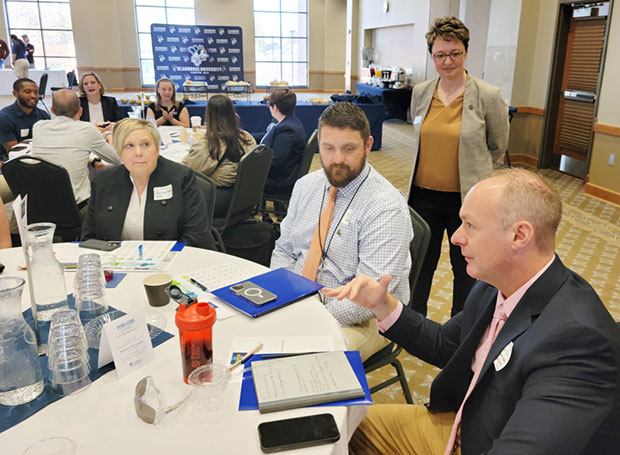
St. Ambrose University President Amy Novak, standing, listens to participants at the university’s second annual Innovation Summit April 13 on the Davenport campus.
By Anne Marie Amacher
The Catholic Messenger
DAVENPORT — Business leaders from across the Quad-City area and the Midwest gathered at St. Ambrose University to identify new ways to prepare students for next-generation careers.
More than 150 business leaders and St. Ambrose staff attended the second annual Innovation Summit April 13 in the Rogalski Center ballroom on campus. “We gained good insight last year,” President Amy Novak said in welcoming remarks. “We have to see new and emerging technology and look for opportunities.” Learning must continue, she said, “from the time we are in the womb until our exit on this earth.”
She cited a World Economic Forum report (2022) that indicates 60% of the jobs in the next decade do not exist currently. In addition, 52% of the jobs in the next five years will require upskilling or reskilling. Fortune magazine reported this year that CEOs indicate that recruiting, retaining and engaging a qualified labor force will be the single-biggest challenge for the next three to five years.
Summit participants explored their mindset regarding a willingness to embrace challenges, critical feedback and seeking out experts and help from specialized sources. They discussed in small groups the characteristics of an organization that exhibits a growth mindset and what a workplace that values ongoing learning looks like.
Kylie Lucas of UnityPoint Health in the Quad Cities said businesses need to listen to their employees as they relay their feelings and those of clients and customers. Janice Dolan of Eastern Iowa Community College-Bettendorf said upper management needs to listen to decision-making ideas from employees to make change happen.
Daniel Marvin with Black Hawk Community College in Moline, Illinois, said companies should set clear goals. “If everything is a priority, the message gets lost in the mix.” Bev Downey-Eads with the National Alliance on Mental Health-Greater Mississippi Valley said change could overwhelm some people, raising their anxiety and making them feel uncomfortable. “You need to build a level of trust and admit mistakes will be made.” Let them know “you are there to help them move forward.”
Dolan advised, “Be ready to implement something and stand behind it with your employees.” TJ Schneckloth, superintendent of the Davenport Community School District, described implementation of something new as a science. Allow employees to ask questions, undertake an initial implementation and then get feedback before fully implementing a change. “It is critical to do it right and be real.”
Novak asked leaders to identify the missing piece that is crucial to business. Dolan said one person should not do everything. “People like to contribute and be a part of the team.” For Schneckloth, it is answering the question: how are businesses supposed to prepare for the future when they don’t know what will exist in the future? Other leaders said a missing piece is acknowledging a place for failure. Some people view failure as a learning opportunity while others view it as defeat. Still other people say upper management does not listen.
During a business panel session, three St. Ambrose alumni talked about the evolution of the talent pipeline, workplace learning and engagement. Linda Nedelcoff, executive vice president of corporate human resources and strategy with CUNA Mutual Group in Milwaukee, said she pushes people to try new experiences and to “take the side roads and get dirty. We learn in bits and bites.”
Patricia Snyder, vice president for home management at Walmart in Bentonville, Arkansas, said, “I want to help employees find their path and run alongside them.” Several years ago when Walmart announced it would merge its store and e-commerce division, she set out to learn how the two divisions could work together. “It gave me the opportunity to learn from others their superpowers and unite talents and experiences.”
Joy Schmidt, manager of organizational development and technology with Modern Woodmen of America based in Rock Island, Illinois, noted many people learn from a variety of experiences beyond traditional learning sources. Businesses want to invest and train their employees and don’t want them to walk out after a year and a half, she said.
Modern Woodmen collaborated with members of the St. Ambrose community, she added, to figure out how to attract employees from the area for information technology (IT) positions that were hard to fill. “We have a huge, talented (work) pool here in the Quad Cities.” As a result, St. Ambrose will add a new IT boot camp to its educational offerings this summer.
The program aims to “build a pipeline of adult learners who show an interest and capacity to begin a career in the field of information technology. Learners will have the opportunity to gain new skills through classroom instruction and work-based experience,” Novak said. Schmidt hopes to hire new IT employees for Modern Woodmen who have completed the program. (Visit www.sau.edu/ITbootcamp for more information about the boot camp).
Several St. Ambrose students in undergraduate and graduate programs shared how learning via internships, clinical settings or community service has been transformational. They offered suggestions for companies to provide professional development opportunities that would attract the students to those companies.
Meanwhile, St. Ambrose plans to launch more than 50 online certificate programs in healthcare, information technology, advanced manufacturing and essential human skills, Novak said. “The future is bright and encouraging.”











